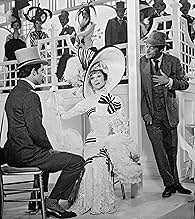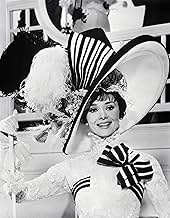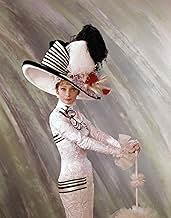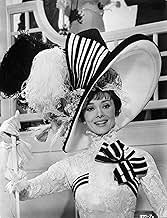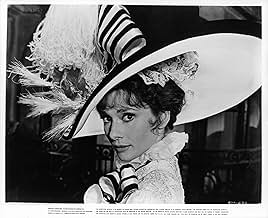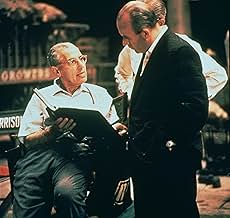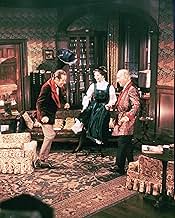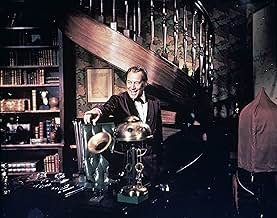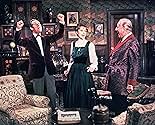My Fair Lady
- 1964
- Tous publics
- 2h 50m
In 1910s London, snobbish phonetics professor Henry Higgins agrees to a wager that he can make a crude flower girl, Eliza Doolittle, presentable in high society.In 1910s London, snobbish phonetics professor Henry Higgins agrees to a wager that he can make a crude flower girl, Eliza Doolittle, presentable in high society.In 1910s London, snobbish phonetics professor Henry Higgins agrees to a wager that he can make a crude flower girl, Eliza Doolittle, presentable in high society.
- Won 8 Oscars
- 26 wins & 13 nominations total
David Ahdar
- Ball Guest
- (uncredited)
- …
Elizabeth Aimers
- Cockney
- (uncredited)
Helen Albrecht
- Ascot Extra
- (uncredited)
John Alderson
- Jamie - Doolittle's crony
- (uncredited)
Mary Alexander
- Cockney
- (uncredited)
Gertrude Astor
- Cockney
- (uncredited)
LaWana Backer
- Ad Lib at Church
- (uncredited)
Walter Bacon
- Ball Guest
- (uncredited)
Featured reviews
10Hitchcoc
I don't know how much I can add to this. The musical stands alone, as far as I'm concerned, so it puts a lot of pressure on the director, George Cukor, one of the greatest, to complement it. This is a lot to ask. I love this movie. I never got a chance to see the Broadway cast (I was four when it opened), but I have never been disappointed. The production numbers are grand, the byplay between the smug, offensive Higgins and Eliza is precious (my favorite song is "Just You Wait, Henry Higgins"). I've always been intrigued how Freddy never even has a chance (I can't watch those wonderful Sherlock Holmes episodes without imagining the grim visage of Jeremy Brett singing "On the Street Where You Live."). The one thing that made an impression on me, though some may see it as a criticism, is how "clean" everything is. There is no doubt in my mind that Cukor was elevating not only the dialogue but the visual images. It's probably not fair to like a movie because you like looking at an actress, but Audrey Hepburn glows in her Eliza, and I don't care if she is or was a street girl, she is the magical rose on the landscape before she ever meets Higgins. The business about who sings the songs is of no significance to me. This is a movie, not the Broadway show, so the images and sounds are melded and presented. Knowing that Audrey Hepburn has a beautiful voice makes it moot as well. I don't know if she could carry the picture or not--maybe not, but it doesn't concern me. When I first saw Stanley Holloway, there was something about him that grated on me (too many performances on the Ed Sullivan Show). He grated on me as Eliza's father. Now, every time I see this film, I thoroughly enjoy him and I really like the comedic qualities of his song. I love how he and his cronies cavort around London with total disregard for their base roots. I could go on, but I really like this film because it is filled with class: George Bernard Shaw filtered through George Cukor. Not bad!
I have read in a great many places (including the IMDb) that Henry Higgins is a misogynist. It has also been said that the film is a misogynist's fairy tale. Anyone saying this has clearly not watched this film too closely.
First, Higgins is not a misogynist. A misogynist hates women. What Higgins is, in reality, is a misanthrope. A misanthrope basically dislikes and distrusts everyone! Watch the film and you'll notice that Higgins treats everyone with the same disregard-Col. Pickering, Eliza's father, his own mother-everyone receives his rather cynical disdain. Some of the minor characters come off being treated worse than the principals do. It's simply more noticeable with Eliza because it's more frequent, it's newer with Eliza because the other principal characters have known Higgins longer and thus take it in stride. The myth that Higgins is a misogynist is perpetuated by the song, "Why Can't A Woman Be More Like a Man?".
Second, it can hardly be called a misogynist's fairy tale. If that were the case, I doubt Alfred Doolittle would have cause to sing, "Get Me To the Church On Time", as he'd hardly be getting married. His life is just as "ruined" as Eliza's by his encounters with Higgins, just as altered as her life has been.
This is a great musical, a good movie and it was even better as the original play by Shaw. Well worth seeing. Recommended.
First, Higgins is not a misogynist. A misogynist hates women. What Higgins is, in reality, is a misanthrope. A misanthrope basically dislikes and distrusts everyone! Watch the film and you'll notice that Higgins treats everyone with the same disregard-Col. Pickering, Eliza's father, his own mother-everyone receives his rather cynical disdain. Some of the minor characters come off being treated worse than the principals do. It's simply more noticeable with Eliza because it's more frequent, it's newer with Eliza because the other principal characters have known Higgins longer and thus take it in stride. The myth that Higgins is a misogynist is perpetuated by the song, "Why Can't A Woman Be More Like a Man?".
Second, it can hardly be called a misogynist's fairy tale. If that were the case, I doubt Alfred Doolittle would have cause to sing, "Get Me To the Church On Time", as he'd hardly be getting married. His life is just as "ruined" as Eliza's by his encounters with Higgins, just as altered as her life has been.
This is a great musical, a good movie and it was even better as the original play by Shaw. Well worth seeing. Recommended.
My Fair Lady, loosely based on George Bernard Shaw's play Pygmalian was a film I saw recently, and I absolutely loved it, and I am 17. It wasn't just the acting, but also the overall look of the film and the music. Mind you, I saw the restored version.
The film looks exquisite, with stunning sets and truly luscious costumes. A prime example is the ballroom scene. Audrey Hepburn's dresses were also a marvel to look at. This was also helped by the superb cinematography, and the detailed direction, provided by George Cukor. The scene at the racetrack was one of my personal favourite scenes from the film. Oh, and the choreography is fabulous.
The script is witty and acerbic, with excellent scenes with the social commentary. The story is simple, but is well told, and fits the lengthy running time perfectly.
The music by Frederick Loewe is just outstanding. Asides from the costumes, the songs are ones that you hear once and never forget. Songs like I Could Have danced All Night, With a Little bit of Luck, Just You wait, Why Can't A Woman Be More Like A Man? and Wouldn't it be Loverly linger long into the memory, and are a joy to the ear. I loved the incidental music at the beginning, then again I am the sort of person who is raised on classical music, and appreciates music for what it is.
The performances also added a lot to the film; Rex Harrison was just superb as the cynical, misanthropic Professor Henry Higgins, who transforms Eliza Doolittle to the woman she is at the end of the film. The Belgian actress Audrey Hepburn is perfectly enchanting as Eliza, and Marnie Nixon provides her singing voice beautifully.(yes she was dubbed, and Audrey Hepburn is not a slut) There is solid support from Stanley Holloway and Gladys Cooper, and watch out for Sherlock Holmes actor Jeremy Brett as Freddy.
In conclusion, a truly beautiful film, that deserved all the praise it got, it is an amazing film, that is misunderstood. It is also a perfect treat for around Easter time. Honestly, for those who think it is the worst movie ever made, see something like Home Alone 4, the only film I can think of that deserves a minus rating, that's how terrible that film is. My Fair Lady gets a 10/10 from me, Bethany Cox.
The film looks exquisite, with stunning sets and truly luscious costumes. A prime example is the ballroom scene. Audrey Hepburn's dresses were also a marvel to look at. This was also helped by the superb cinematography, and the detailed direction, provided by George Cukor. The scene at the racetrack was one of my personal favourite scenes from the film. Oh, and the choreography is fabulous.
The script is witty and acerbic, with excellent scenes with the social commentary. The story is simple, but is well told, and fits the lengthy running time perfectly.
The music by Frederick Loewe is just outstanding. Asides from the costumes, the songs are ones that you hear once and never forget. Songs like I Could Have danced All Night, With a Little bit of Luck, Just You wait, Why Can't A Woman Be More Like A Man? and Wouldn't it be Loverly linger long into the memory, and are a joy to the ear. I loved the incidental music at the beginning, then again I am the sort of person who is raised on classical music, and appreciates music for what it is.
The performances also added a lot to the film; Rex Harrison was just superb as the cynical, misanthropic Professor Henry Higgins, who transforms Eliza Doolittle to the woman she is at the end of the film. The Belgian actress Audrey Hepburn is perfectly enchanting as Eliza, and Marnie Nixon provides her singing voice beautifully.(yes she was dubbed, and Audrey Hepburn is not a slut) There is solid support from Stanley Holloway and Gladys Cooper, and watch out for Sherlock Holmes actor Jeremy Brett as Freddy.
In conclusion, a truly beautiful film, that deserved all the praise it got, it is an amazing film, that is misunderstood. It is also a perfect treat for around Easter time. Honestly, for those who think it is the worst movie ever made, see something like Home Alone 4, the only film I can think of that deserves a minus rating, that's how terrible that film is. My Fair Lady gets a 10/10 from me, Bethany Cox.
8dxia
During the first two hours of this movie, I had thought that it was the greatest musical ever brought to film. It's only during the last hour that it begins to languish and plod. If the first two hours are a solid 10/10, then the last hour is about a 4/10. It brings the average to about 8/10, which is exactly what I gave the movie, but it's fun to think about how great the movie could have been had the producers decided to find a better ending to an otherwise superb story.
It goes to show that film is a tricky medium, and regardless of how great musicals can be, live action simply isn't as interesting when it's recorded. 'My Fair Lady' could have used a bit of trimming, especially in Stanley Holloway's pieces, WITH A BIT OF LUCK and GET ME TO THE CHURCH ON TIME. Although they may have been spectacular to see on stage, movie audiences will yearn to see more about Eliza and wonder why the director spends so much time on her father.
On the brighter side, I believe that I have never seen Audrey Hepburn in a more perfect role. Eliza Doolittle is a lot like she, in their rise from poverty. And watching Audrey is like being invited to see a person shine in their most perfect niche. She isn't gorgeous in a modern sense, but even a decade after her death, her image still carries that immortal appeal. Some critics call it the "it" factor. We don't know what "it" is but we know it's there.
Billy Wilder once said, "God kissed her face, and there she was." For me, I just like her smile, and my smile when I watch her exuberance in one of the defining roles in her career.
It goes to show that film is a tricky medium, and regardless of how great musicals can be, live action simply isn't as interesting when it's recorded. 'My Fair Lady' could have used a bit of trimming, especially in Stanley Holloway's pieces, WITH A BIT OF LUCK and GET ME TO THE CHURCH ON TIME. Although they may have been spectacular to see on stage, movie audiences will yearn to see more about Eliza and wonder why the director spends so much time on her father.
On the brighter side, I believe that I have never seen Audrey Hepburn in a more perfect role. Eliza Doolittle is a lot like she, in their rise from poverty. And watching Audrey is like being invited to see a person shine in their most perfect niche. She isn't gorgeous in a modern sense, but even a decade after her death, her image still carries that immortal appeal. Some critics call it the "it" factor. We don't know what "it" is but we know it's there.
Billy Wilder once said, "God kissed her face, and there she was." For me, I just like her smile, and my smile when I watch her exuberance in one of the defining roles in her career.
My Fair Lady is a musical which is very witty. The dialogue is wonderful. The story begins as Henry Higgins (Rex Harrison) makes a bet that he can transform flower girl Eliza Dolittle (Audrey Hepburn) into a high society lady. Henry Higgins is the perfect example of high society snobbery of the times. What he wasn't counting on was falling in love with his "project". Some people may find this film to be sexist but it is really quite the opposite. While it is about a sexist person it is not actually sexist at all. In fact it is all about the irony in the relationship between that of Eliza Dolittle and Henry Higgins. It is not unbelievable that Henry and Eliza should fall in love because they are not "compatible". Opposites often attract after all. Even though there is an anti-romantic disclaimer in the original play Pygmalion , it is obvious that Eliza and Higgins are meant for one another in the end of My Fair Lady. My Fair Lady is really different from Pygmalion. There is a movie version of Pygmalion which is the dull non-musical version of My Fair Lady. Rex Harrison is simply wonderful as Henry Higgins. He is not one bit tired with his role. And even though Julie Andrews originated the role of Eliza on Broadway, Audrey Hepburn is great in the role. It would be unfair to say that she didn't deserve the role just because her voice was dubbed. The supporting cast is first rate as well. This film is more than just good, it is great. If you have not seen it yet you certainly should!
*****/ ***** stars
*****/ ***** stars
Oscars Best Picture Winners, Ranked
Oscars Best Picture Winners, Ranked
See the complete list of Oscars Best Picture winners, ranked by IMDb ratings.
Did you know
- TriviaCostume designer Cecil Beaton created 1,500 costumes for this movie, with the exception of the pearl white gown Hepburn wears to the Embassy Ball, an original Edwardian specimen Beaton found in an antique shop.
- GoofsWhen Prof. Higgins sings "An Ordinary Man" he turns on several phonographs, seconds later he turns off one of them but all of the sounds stop.
- Quotes
Professor Henry Higgins: There even are places where English completely disappears; in America they haven't used it for years.
- Crazy creditsIn the posters, playbills and the original cast album for the stage version of "My Fair Lady", the credits always read "based on Bernard Shaw's 'Pygmalion' ", letting the audience know what play "My Fair Lady" was actually adapted from. The movie credits simply read "from a play by Bernard Shaw".
- Alternate versionsIn the remastered version of the film, some of the scene changes are changed from sudden cuts to wipe outs, as they probably were when the film was released. When CBS Fox released it on video originally, they were changed to sudden cuts.
- ConnectionsFeatured in Toast of the Town: Episode #18.17 (1965)
- SoundtracksWhy Can't the English?
(1956) (uncredited)
Music by Frederick Loewe
Lyrics by Alan Jay Lerner
Performed by Rex Harrison, Wilfrid Hyde-White, and Audrey Hepburn
Details
- Release date
- Country of origin
- Official site
- Language
- Also known as
- Mi bella dama
- Filming locations
- Stage 16, Warner Brothers Burbank Studios - 4000 Warner Boulevard, Burbank, California, USA(Ascot & Ballroom scenes)
- Production company
- See more company credits at IMDbPro
Box office
- Budget
- $17,000,000 (estimated)
- Gross US & Canada
- $72,560,711
- Opening weekend US & Canada
- $354,764
- Feb 17, 2019
- Gross worldwide
- $72,685,970
- Runtime
- 2h 50m(170 min)
- Color
- Sound mix
- Aspect ratio
- 2.20 : 1
Contribute to this page
Suggest an edit or add missing content







